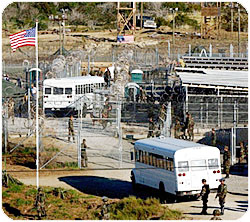FEATURE ARTICLE -
Issue 30 Articles, Issue 30: Oct 2008
The existence of a state of warfare, inevitably, heralds Constitutional controversy in the United States, raising profound questions of the impact on individual rights that occurs when liberty appears to come into conflict with security. In Boumediene v Bush, the US Supreme Court, on 16 June 2008, held that foreign nationals held at the offshore detention centre at Guantanamo Bay have a right to pursue a Constitutional writ of habeas corpus to challenge their detention. In doing so, the Court upheld the belief that security subsists “in fidelity to freedom’s first principles. Chief among these are freedom from arbitrary and unlawful restraint and the personal liberty that is secured by adherence to the separation of powers.”1
Justice Kennedy delivered the opinion of the Court. In response, Chief Justice Roberts and Justice Scalia wrote dissenting opinions, which were each joined by the other members of the minority. By a majority of 5 to 4, the Court found that the Constitution applies to individuals held by the US in circumstances of de facto sovereignty, even when the detainees are aliens, held as enemy combatants in a location that is not US territory. Congress was unable invoke the suspension clause of the Constitution, which requires that the nation be facing rebellion or invasion in order that the writ of habeas corpus be removed. The Military Commissions Act of 2006 (MCA) unlawfully purported to suspend the writ whilst the Detainees Treatment Act of 2005 (DTA) provided an ineffective substitute for the writ by implementing a system of review by civilian courts.
Facts and Questions raised in Boumediene
 The facts of the case were relatively simple. The petitioners for the writ of habeas corpus were aliens designated as enemy combatants by the US and detained at the Guantanamo Bay Naval Station. They were captured by US armed forces in places as diverse as Bosnia, Gambia and Afghanistan under the President’s authority to use all necessary force against those nations, organizations or persons determined to have been responsible for the September 11 terrorist attacks. All of the petitioners were foreign nationals, but none were citizens of a nation at war with the US, and each denied membership of the Al-Qaeda terrorist network. These circumstances had given rise a previous decision by the Supreme CourtâRasul v Bush,2 in which the Court had held that statutory jurisdiction was to be granted to claims for habeas corpus brought by foreign nationals held at Guantanamo Bay. Following this decision, legislation passed by Congress in the form of the MCA eliminated this statutory jurisdiction with the result that the basis of any claim for consideration of the legality of potentially indefinite Executive detention must be rooted in the Constitution, or not at all. The Suspension clause of the Constitution provides that the writ of habeas corpus “shall not be suspended, unless when in Cases of Rebellion or Invasion the public safety may require it.”3 The issues of the case were thus whether the clause applied extraterritorially, and if so, whether it had been violated by the MCA.
The facts of the case were relatively simple. The petitioners for the writ of habeas corpus were aliens designated as enemy combatants by the US and detained at the Guantanamo Bay Naval Station. They were captured by US armed forces in places as diverse as Bosnia, Gambia and Afghanistan under the President’s authority to use all necessary force against those nations, organizations or persons determined to have been responsible for the September 11 terrorist attacks. All of the petitioners were foreign nationals, but none were citizens of a nation at war with the US, and each denied membership of the Al-Qaeda terrorist network. These circumstances had given rise a previous decision by the Supreme CourtâRasul v Bush,2 in which the Court had held that statutory jurisdiction was to be granted to claims for habeas corpus brought by foreign nationals held at Guantanamo Bay. Following this decision, legislation passed by Congress in the form of the MCA eliminated this statutory jurisdiction with the result that the basis of any claim for consideration of the legality of potentially indefinite Executive detention must be rooted in the Constitution, or not at all. The Suspension clause of the Constitution provides that the writ of habeas corpus “shall not be suspended, unless when in Cases of Rebellion or Invasion the public safety may require it.”3 The issues of the case were thus whether the clause applied extraterritorially, and if so, whether it had been violated by the MCA.
The Court’s Reasoning
The first threshold question determined by the Court was whether the MCA denies the federal courts jurisdiction to hear habeas corpus actions pending at the time of its enactment. It was held that the statute does deny that jurisdiction, thus raising the subsequent question of Constitutional validity. In moving to this, the primary issue of the case, the Court considered that two issues were central to any analysis of the extraterritorial application of the writ. The first was the history of the protection provided by habeas corpus, which had established that it was one of the “few safeguards of liberty specified in a Constitution that, at the outset, had no Bill of Rights.”4 The second was whether, to the extent that there were settled precedents in 1789 regarding the extraterritorial scope of the writ or its application to enemy aliens, those authorities can be instructive for the present cases. These examinations revealed that the writ was intended to be foundational to due process and the rule of law embodied in the Constitution but that there was no dispositive indication which emerged from common law precedent as to whether “a petition for a writ of habeas corpus brought by an enemy combatant … when held in a territory, like Guantanamo, over which the Government has total military and civil control,”5 would or would not be granted.
 For the Court, the determining factor for answering this question was that of defining sovereignty for the purposes of the Constitution and its application. The Government argued that the Suspension Clause of the Constitution could not afford the petitioners any rights because the US does not claim sovereignty over the place of detention. The Court found, however, that, whilst Cuba maintains sovereignty, in the legal and technical sense of the term, over Guantanamo Bay, this does not end the analysis. Rather, the Court considered that:
For the Court, the determining factor for answering this question was that of defining sovereignty for the purposes of the Constitution and its application. The Government argued that the Suspension Clause of the Constitution could not afford the petitioners any rights because the US does not claim sovereignty over the place of detention. The Court found, however, that, whilst Cuba maintains sovereignty, in the legal and technical sense of the term, over Guantanamo Bay, this does not end the analysis. Rather, the Court considered that:
“our cases do not hold it is improper for us to inquire into the objective degree of control the Nation asserts over foreign territory. … [I]t is not altogether uncommon for a territory to be under the de jure sovereignty of one nation, while under the plenary control, or practical sovereignty, of another. … [W]e take notice of the obvious and uncontested fact that the United States, by virtue of its complete jurisdiction and control over the base, maintains de facto sovereignty over this territory.”6
On the basis of this finding, the Court thus examined whether it is open, in light of the previous jurisprudence of the Court, to find that the Constitution applies to those individuals held in such conditions of de facto sovereignty. As in Rasul, this involved a consideration of the Court’s decision in Johnson v Eisentrager,7 where it addressed whether habeas corpus jurisdiction extended to enemy aliens convicted of violating the laws of war. This case, in which access to the writ was denied, was cited by the Government in Boumediene as determinative that the Court had previously adopted a formalistic, sovereignty-based test for assessing Constitutional reach. This contention was rejected by the Court for three reasons. First, this finding of the Eisentrager Court was not the only authoritative pronouncement on the issue; second, there was no basis for the conclusion that the “Eisentrager Court used the term sovereignty only in the narrow technical sense and not to connote the degree of control the military asserted over the facility”;8 and, finally, such a reading would repudiate the series of cases determined by the Court, referred to as the ‘Insular Cases’,9 as well as the later decision by the Court in Reid v Covert.10 In the Court’s opinion, the common thread running through these cases was “that questions of extraterritoriality turn on objective factors and practical concerns, not formalism.”11 The analysis of such objective factorsâthe characteristics of the detainee, the nature of the sites where apprehension and detention occurred, and any practical obstacles inherent in resolving the prisoner’s entitlement to the writâled the Court to hold that the Suspension Clause of the Constitution has full effect at the Guantanamo Bay Naval Station.12
Given the operation of the Suspension Clause, the Court turned its attention to the question of whether the statute stripping jurisdiction to issue the writ avoided this Clause’s mandate because Congress provided adequate substitute procedures for habeas corpus. It found that the procedures implemented by the Detainees Treatment Act were insufficient for, whilst an adequate substitute need not duplicate §2241 of the US Codeâwhich grants federal jurisdiction to issue writs of habeas corpusâ, the measures and procedures implemented in lieu were intended by Congress to be so limited so as to deprive the prisoner of any meaningful procedural protection that could resemble habeas corpus.
The Dissents — Roberts CJ and Scalia J
Two strong dissenting opinions were delivered in response to Kennedy J’s. The Chief Justice stated that the:
“important point … is that the Court should have resolved these cases on other grounds … the critical threshold question in these cases, prior to any inquiry about the writ’s scope, is whether the system the political branches designed protects whatever rights the detainees may possess. If so, there is no need for any additional process, whether called ‘habeas’ or something else.”13
In the opinion of Roberts CJ, by striking down the DTA process in favour of an ill-defined and vague habeas right that will be shaped only in the future by district courts on a case-by-case basis, the decision simply shifted the responsibility for reconciling “review of prisoners’ detention with the undoubted need to protect the American people from the terrorist threat … from the elected branches to the Federal Judiciary.”14
Scalia J takes issue, not only with the majority’s approach to assessing the adequacy by which the DTA process supplants the writ of habeas corpus, but with the majority’s finding that the scope of the writ extends extraterritorially. His contentionâthat the Suspension Clause has no application and thus the Court’s intervention in what is essentially a military matter is ultra viresâis prefaced with a exposition of the negative consequences of the opinion for America’s prosecution of the “war with radical Islamists”15 and the future security of the Nation. Scalia J asks:
“What competence does the Court have to second-guess the judgment of Congress and the President on such a point? None whatever. But the Court blunders in nonetheless. Henceforth, as today’s opinion makes unnervingly clear, how to handle enemy prisoners in this war will ultimately lie with the branch that knows least about the national security concerns that the subject entails.”16
Scalia J’s argument against the majority’s decision on the issue of the extraterritorial application of the Suspension Clause is that its interpretation of jurisprudenceâmost notably the Eisentrager decisionâon that question is misguided and, where uncertainty and ambiguity may remain, its arguments for application rest upon an egregious distortion of the principles of the separation of powers. In short, just as the scope of the writ was ‘designed to restrain’ the exercise of executive power, the “understood limits of that scope were … just as much ‘designed to restrain’ the incursions of the Third Branch.”17
 Conclusion
Conclusion
In Boumediene, the Court made clear that the separation of powers enshrined in the Constitution cannot be circumvented, except in cases of the most dire threat to the integrity of the nation. Particularly, the concept of sovereignty cannot be construed in such a formalistic manner so as to enable fundamental rights such as habeas corpus to be whittled away by legislation in the name of national security. The Court made no pronouncement as to the grant of the writ of habeas corpus nor did it address the content of the law that would determine such question. Rather, it recognised that the rule of law, and the jurisdiction of the courts to enforce it, “are designed to survive, and remain in force, in extraordinary times,”18 notwithstanding the national security policy to which it applies.
Julian Gruin
Footnotes
- 553 U.S. __ (2008), opinion of Kennedy J at 68
- 542 U.S. 466 (2004)
- Art. 1, §9, cl. 2
- 553 U.S. __ (2008), opinion of Kennedy J at 8
- Ibid, at 16
- Ibid, at 24-25
- 339 U.S. 763 (1950)
- 553 U.S. __ (2008), opinion of Kennedy J at 33
- See De Lima v Bidwell, 182 U. S. 1 (1901); Dooley v United States, 182 U. S. 222 (1901); Armstrong v United States, 182 U. S. 243 (1901); Downes v Bidwell, 182 U. S. 244 (1901); Hawaii v Mankichi, 190 U. S. 197 (1903); Dorr v United States, 195 U. S. 138 (1904).
- 354 U.S. 1 (1957)
- 553 U.S. __ (2008), opinion of Kennedy J at 34
- Ibid, at 41
- 553 U.S. __ (2008), opinion of Roberts CJ at 2
- Ibid, at 3
- 553 U.S. __ (2008), opinion of Scalia J at 2
- Ibid, at 6
- Ibid, at 9
- 553 U.S. __ (2008), opinion of Kennedy J at 70




 The facts of the case were relatively simple. The petitioners for the writ of habeas corpus were aliens designated as enemy combatants by the US and detained at the Guantanamo Bay Naval Station. They were captured by US armed forces in places as diverse as Bosnia, Gambia and Afghanistan under the President’s authority to use all necessary force against those nations, organizations or persons determined to have been responsible for the September 11 terrorist attacks. All of the petitioners were foreign nationals, but none were citizens of a nation at war with the US, and each denied membership of the Al-Qaeda terrorist network. These circumstances had given rise a previous decision by the Supreme CourtâRasul v Bush,2 in which the Court had held that statutory jurisdiction was to be granted to claims for habeas corpus brought by foreign nationals held at Guantanamo Bay. Following this decision, legislation passed by Congress in the form of the MCA eliminated this statutory jurisdiction with the result that the basis of any claim for consideration of the legality of potentially indefinite Executive detention must be rooted in the Constitution, or not at all. The Suspension clause of the Constitution provides that the writ of habeas corpus “shall not be suspended, unless when in Cases of Rebellion or Invasion the public safety may require it.”3 The issues of the case were thus whether the clause applied extraterritorially, and if so, whether it had been violated by the MCA.
The facts of the case were relatively simple. The petitioners for the writ of habeas corpus were aliens designated as enemy combatants by the US and detained at the Guantanamo Bay Naval Station. They were captured by US armed forces in places as diverse as Bosnia, Gambia and Afghanistan under the President’s authority to use all necessary force against those nations, organizations or persons determined to have been responsible for the September 11 terrorist attacks. All of the petitioners were foreign nationals, but none were citizens of a nation at war with the US, and each denied membership of the Al-Qaeda terrorist network. These circumstances had given rise a previous decision by the Supreme CourtâRasul v Bush,2 in which the Court had held that statutory jurisdiction was to be granted to claims for habeas corpus brought by foreign nationals held at Guantanamo Bay. Following this decision, legislation passed by Congress in the form of the MCA eliminated this statutory jurisdiction with the result that the basis of any claim for consideration of the legality of potentially indefinite Executive detention must be rooted in the Constitution, or not at all. The Suspension clause of the Constitution provides that the writ of habeas corpus “shall not be suspended, unless when in Cases of Rebellion or Invasion the public safety may require it.”3 The issues of the case were thus whether the clause applied extraterritorially, and if so, whether it had been violated by the MCA. For the Court, the determining factor for answering this question was that of defining sovereignty for the purposes of the Constitution and its application. The Government argued that the Suspension Clause of the Constitution could not afford the petitioners any rights because the US does not claim sovereignty over the place of detention. The Court found, however, that, whilst Cuba maintains sovereignty, in the legal and technical sense of the term, over Guantanamo Bay, this does not end the analysis. Rather, the Court considered that:
For the Court, the determining factor for answering this question was that of defining sovereignty for the purposes of the Constitution and its application. The Government argued that the Suspension Clause of the Constitution could not afford the petitioners any rights because the US does not claim sovereignty over the place of detention. The Court found, however, that, whilst Cuba maintains sovereignty, in the legal and technical sense of the term, over Guantanamo Bay, this does not end the analysis. Rather, the Court considered that: Conclusion
Conclusion